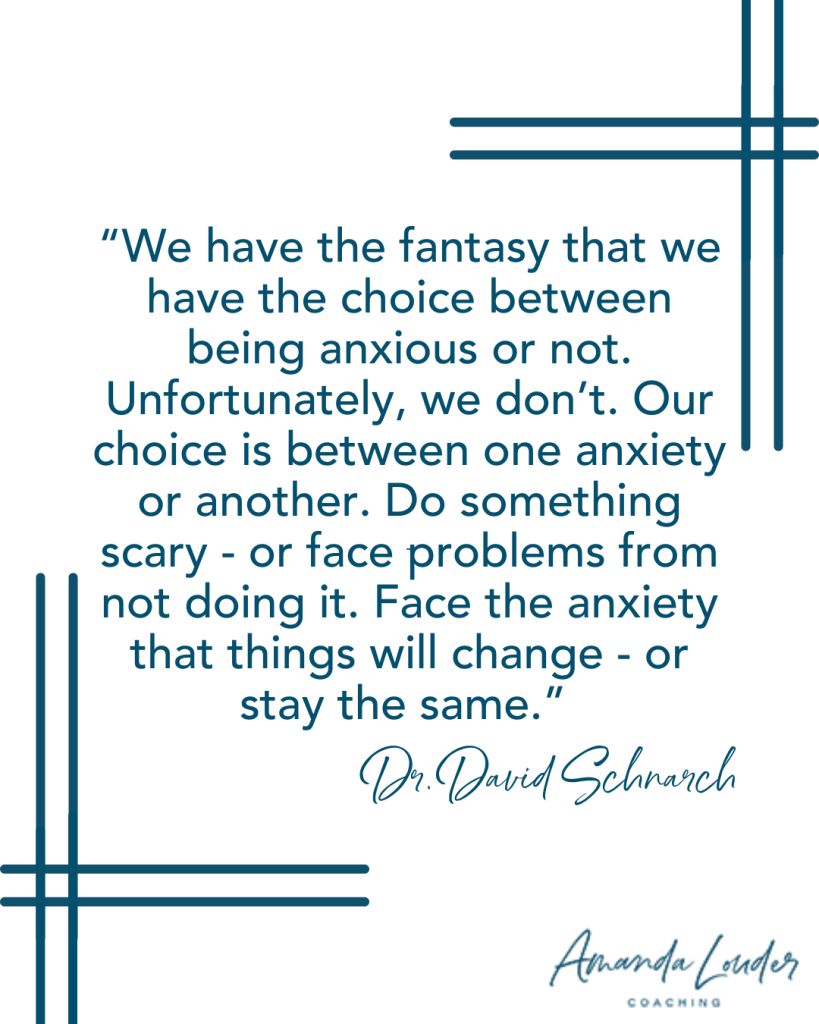
Sex, intimacy, and personal growth are all tied together. And when your partner doesn’t want to grow sexually, but you do, it can cause a lot of conflict. It’s not uncommon to find yourself in a situation like this, so in this episode, I’m going to share with you three steps to take to understand the situation completely. I’ll even share with you what to say that may help the situation.

Show Notes:
Follow Amanda on Facebook and Instagram.
Join Amanda’s Private Facebook Group.
Show Summary:
Last week on the podcast we talked about mature feminine sexuality and what that looks like. I think it’s fair to say that many of the things I talked about apply to men as well. Unfortunately, it’s not uncommon to find yourself in a situation where you’re eager to explore and develop your sexuality, but your partner isn’t on the same page.
A few times every week I get heartfelt emails from husbands and wives who are frustrated, sad, lonely, and discouraged. They want so much to have a good sexual relationship with their spouse, but no matter what they do or say, nothing changes. These emails break my heart because I hear the pain that is in them. What they want and desire is good and is a righteous desire. But no matter what they do, nothing seems to change, and the relationship can even seem to deteriorate when one partner is pushing for a certain outcome.
So what do you do when your partner won’t grow sexually? That’s what we are going to discuss today.
To grow yourself up sexually often means exposing your innermost self and risking rejection from your partner. That is a very anxiety producing prospect to the majority of people. And depending on your upbringing, changing the way you think, believe, and operate in the sexual realm can also feel like and appear to be a rejection of the things that you were taught by your parents, by your religion, and by society. It can often feel like you are risking not only rejection from your spouse, but rejection from your parents and even from God. Again, very anxiety producing. And I don’t know a lot of people who love to feel that level of anxiety, especially voluntarily. So it makes a lot of sense to me that growing yourself up sexually feels very scary and maybe even wrong.
So, what should you do in this situation? What should you do when you want more in your sexual and intimate relationship but your partner doesn’t?
The first step is understanding the dynamics at play. Your partner’s desire to not change is just as legitimate as your desire to change. They have a different perspective and so it’s important to have compassion and empathy for where they are. They have good reasons for why they think and believe the way they do. So getting curious about those reasons is important. It could be their conditioning. It could be trauma or past experiences and outcomes. It could be insecurity. Or it could simply be a lack of awareness, understanding, and education. So it’s crucial to seek first to understand them before expecting them to understand you. Work on being present with “what is” instead of how you want them to be. While we think that “there” is better than “here,” it’s usually not better, it’s just different. Anytime we aren’t present with what is, we are creating suffering for ourselves. Making room for both of you to be who you are in the relationship is important. If you have resistance to that, be curious with yourself about that resistance to loving them as they are now. What is it triggering within you? Why? If they were to change (or if they don’t change) what do I make that mean about myself?
The second step is to lead through example. Decide to embody the qualities you are projecting onto them and lead through example instead of criticism or trying to change them. Do you want to feel loved and validated through your sexuality? Love and validate them as they are now. Do you want to feel desired by them? Desire them as they are now, without being pushy. Act in a way that shows you are someone worthy of desiring. Do you want more intimacy and connection? Be honest. Reveal yourself and your mind to them, even if they don’t do the same in return.
The third step is to communicate openly. If your partner seems hesitant to embrace the growth you are seeking, create a safe space for open dialogue. Share your feelings, desires, and concerns, and encourage your partner to do the same. Avoid blame or accusations, but rather focus on expressing your needs and aspirations. Often when we think we are being open and honest with our partner, we are, but we are accusing them and blaming them in the process. Here’s a sample dialogue that often works, although it’s not a guarantee. “I love you so much. And because I love you I want a good relationship with you in all aspects. While I think we are great in these areas, I would like to work together to have a better relationship in these areas. Having an intimate and sexual relationship with you is important to me because YOU are important to me and I want to be able to express that love for each other in every area of our life.”
One thing that I have found, especially if this has been a challenge for the two of you for years, is that often you need an outside perspective to help the two of you navigate this. Professional assistance can provide insights, tools, and exercises that can help both partners understand each other better and work towards a more fulfilling connection. It’s really hard to see how you yourself are contributing to the dynamic and we tend to be hyper focused on what our spouse is doing wrong. Having an outside perspective gives both parties a chance to look at themselves more honestly, which can be hard. But most people who I know that are in this field, including myself, are able to look at things from a place of compassion and empathy rather than judgment. And when you have someone offering you compassion, it’s easier to give it to yourself and your spouse. Even if your spouse is unwilling to see a coach or therapist, I encourage you to do it by yourself. While I believe that the most change can happen when you have two willing people working to improve things, change can often be made with one person changing the dynamic.
But if your spouse is hesitant to invest in the relationship, encourage them to explore personal development. This might involve pursuing hobbies, self-reflection, or even seeking therapy individually. A person’s sexual confidence is very intertwined with their overall self-esteem, so doing things to improve that can also help in the bedroom.
Sometimes when I get emails from individuals I can see a lot of the dynamic that is creating problems even from one email. With some, I help them see that they can’t change their spouse, they can only change themselves and direct them to resources to help strengthen themselves and hopefully change the dynamic. For others, I suspect there is not a lot of hope, and help them see that there may have some hard decisions ahead. Either way, it’s not an easy road. Growth in the relationship is hard and anxiety producing, but not having what you want in the relationship can also be hard. And sometimes they may even decide that if their partner is unwilling to grow or change then the relationship is no longer tenable. And when that is the case, it is heartbreaking.
Dr. David Schnarch, in the book Passionate Marriage calls the dynamic with two hard decisions the Two-Choice Dilemma. He says “We have the fantasy that we have the choice between being anxious or not. Unfortunately, we don’t. Our choice is between one anxiety or another. Do something scary – or face problems from not doing it. Face the anxiety that things will change – or stay the same.”
The two-choice dilemma highlights that we often try to remain in our perplexing, awkward, and painful situations to keep everything in check and avoid the anxiety of change but a choice is often required to change our situation. We want two choices but we only get one. And often we avoid choosing (by remaining in difficult situations) in order to avoid losses in giving up one option for another. We want our sexual relationship and marriage to be better BUT we also want our spouse to change so that it can be. We don’t want to remain in our current relationship as it is, yet we love our spouse and our children and don’t want to break up our family. These are HARD decisions. But a decision must be made or we will stay in a place of perpetual misery UNLESS our spouse decides (often on their own and without pressure) to mature and change.
Many of the men listening here might be thinking that they are in this position with a wife that doesn’t want to grow up sexually. And that could be true. But I’m guessing there are many women listening who are also thinking about their spouse who won’t grow up by giving up his pornography habit or won’t grow up and explore actual intimacy, not just sex. This isn’t a one-sided problem. This happens in many, many marriages and it happens all of the time.
Hopefully we can work on things in coaching or in therapy to help you move into a better place, but if you have one spouse who really just wants things to stay status quo and is not interested in changing or growing up. And you have another spouse who is very interested in growth and change and progression, those two things don’t usually mix. So that’s usually when the relationship becomes untenable.
I often talk about intimacy as a spectrum. And this is something I learned from my mentor, Aimée Gianni. On one side of the spectrum, we have pretend, polite, and parallel. Those kinds of relationships look good from the outside. They look easy from the outside. Most of the problems get swept under the rug. Anxieties are not dealt with. And you might be really good at functioning in some parts of your marriage. Like the business of marriage might be really good, but there’s just not a lot of intimacy, which includes sex, but is not just sex.
And then on the other end of the spectrum, you have intimacy, which is intimate, honest, and connected. And that also looks really messy usually because you’re not sweeping conflicts under the rug. You’re dealing with them, which is messy and hard, but leads to more intimacy and growth in the marriage.
And when you have one who wants to be more on the pretend polite and parallel side and one who wants to be on the more intimate, honest, and collaborative side, that doesn’t usually work in a marriage, unless one person is like, well, this is what I want, but I’m willing to just put up with the other, which is usually the person wanting more intimacy, willing to put up with the pretend plight and parallel.
So, it’s just not an easy situation and it’s really hard. And that’s why I always suggest coming into coaching to help you navigate and work through these things so that you are showing up as your best self in the relationship.
Sex, intimacy, and personal growth are all tied together. And while we think we might be mature because ONE of these areas seems easy for us, we need to look at all of these areas and see where we need to grow up. Because NONE of us are immune. We all need to mature and grow. So if you have been listening to this podcast and seeing all the ways your spouse needs to grow, I encourage you to stop and look at yourself first.





